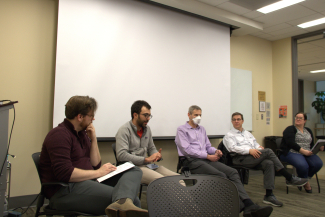To try to demystify the transition into academia, the JILA postdoc group recently hosted a faculty negotiation panel with a distinguished lineup of speakers: JILA Fellow and NIST Physicist Adam Kaufman, JILA and NIST Fellow Konrad Lehnert, and JILA Fellow Mathias Weber. The discussion was expertly moderated by Rachael Merritt and Jake Higgins, both postdoctoral researchers, who navigated a comprehensive array of topics with the panelists.
The session opened a window into the often opaque process of faculty negotiations, providing valuable insights into what new faculty members can and should negotiate as part of their start-up package. The panelists emphasized the importance of being well-prepared to discuss salary and the support available for research, teaching responsibilities, and lab space.
Each speaker shared personal anecdotes and strategies from their negotiations, highlighting the variability in what institutions offer and the significance of understanding one's priorities and needs.
The audience of postdocs and senior undergraduates also asked questions about negotiating and designing new laboratory space once a faculty member is established. The panelists offered practical advice on approaching this daunting task, stressing the need for flexibility and foresight. JILA Fellow Mathias Weber stated the importance of electrical power in the laboratory.
"Be sure to think about how much power your lab might need and then double it," he said. "That way, you don't run out of electrical outlets. I'm just now running out of outlets after being here at JILA for 18 years."
JILA and NIST Fellow Konrad Lehnert highlighted creating a flexible plan, so your research doesn't stall when your equipment is behind schedule. "If you can do the computational part of your experiment while you're waiting, start with that," he mentioned.
Recruiting and mentoring graduate students was another pivotal topic. The speakers shared their perspectives on identifying promising candidates, building a cohesive research team, and the crucial role of mentorship in graduate students' success.
JILA Fellow and NIST physicist Adam Kaufman emphasized that recruiting the first batch of graduate students and postdocs can happen anywhere. He mentioned that for his research, he recruited his first students out of a previous laboratory when he was a postdoctoral researcher.
The JILA postdoc group's faculty negotiation panel was a rare opportunity for JILA postdocs and senior undergraduate students to gain firsthand knowledge from experienced faculty about the challenges and opportunities of starting an academic career.
Through candid discussions and shared experiences, the panelists demystified aspects of the negotiation process, lab setup, and student recruitment, providing invaluable guidance for the next generation of academics.
Written by Kenna Hughes-Castleberry





